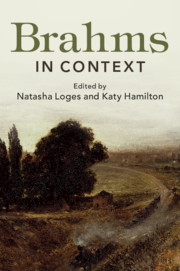Book contents
- Brahms in Context
- Brahms in Context
- Copyright page
- Dedication
- Contents
- Illustrations
- Music Examples
- Notes on Contributors
- Preface
- Abbreviations
- Part I Personality, People and Places
- Part II Identities, Environments and Influences
- Chapter 8 Finances
- Chapter 9 As Pianist
- Chapter 10 As Conductor
- Chapter 11 As Arranger
- Chapter 12 As Editor
- Chapter 13 As Teacher
- Chapter 14 Private Music-Making
- Chapter 15 Concert Life
- Chapter 16 Genre
- Chapter 17 Folk Music
- Chapter 18 Early Music
- Part III Performance and Publishing
- Part IV Society and Culture
- Part V Reception and Legacy
- Further Reading
- Index
- References
Chapter 15 - Concert Life
from Part II - Identities, Environments and Influences
Published online by Cambridge University Press: 15 May 2019
- Brahms in Context
- Brahms in Context
- Copyright page
- Dedication
- Contents
- Illustrations
- Music Examples
- Notes on Contributors
- Preface
- Abbreviations
- Part I Personality, People and Places
- Part II Identities, Environments and Influences
- Chapter 8 Finances
- Chapter 9 As Pianist
- Chapter 10 As Conductor
- Chapter 11 As Arranger
- Chapter 12 As Editor
- Chapter 13 As Teacher
- Chapter 14 Private Music-Making
- Chapter 15 Concert Life
- Chapter 16 Genre
- Chapter 17 Folk Music
- Chapter 18 Early Music
- Part III Performance and Publishing
- Part IV Society and Culture
- Part V Reception and Legacy
- Further Reading
- Index
- References
Summary
The claim that the nineteenth century was the century of the bourgeoisie or middle class (Bürgertum) is undeniably a hot topic in research. This claim provokes questions not only about the wider definition of ‘bourgeoisie’ but also about the accuracy of this claim specifically for music history. Brahms rarely travelled outside German-speaking territories, apart from eight trips to Italy and concerts in the Netherlands. Within this region, the bourgeoisie did not consist of a single, homogenous group but could be described variously in social, political or behavioural terms, with overlaps between these. In terms of social class, the term primarily describes those who practised an established ‘craft’ in the broadest sense, as Brahms’s father did [see Ch. 1 ‘Childhood in Hamburg’]. In political terms, the middle class (Bürger) bore a degree of responsibility; however, even after the revolutions of 1848, their real power was still very restricted within a society which was still largely dominated by the aristocracy.
Information
- Type
- Chapter
- Information
- Brahms in Context , pp. 138 - 148Publisher: Cambridge University PressPrint publication year: 2019
